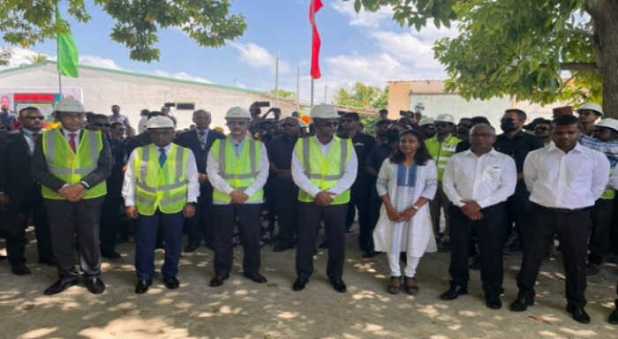
Addu City (Maldives), March 27 : Maldives President Ibrahim Mohamed Solih on Sunday said that the Maldives would always uphold its ‘India First’ policy and it remains committed to enhancing the close ties with India. He said this during the courtesy call paid on him by Indian External Affairs Minister S Jaishankar on Sunday morning at the Equator Village in Addu City. The President and the EAM discussed existing bilateral cooperation and the close friendship between Maldives and India. They agreed to continue efforts to further enhance and strengthen the bond between the two neighbouring countries through areas of mutual concern, benefit and interest in the global sphere, the President’s office said. President Solih recalled that India was the first country he visited shortly after assuming office. Expressing gratitude for India’s “Neighbourhood First Policy”, he stated that the Maldives continues to gain immense benefits from this policy. The President reiterated that the Maldives would always uphold its “India First” policy and that it remains committed to enhancing the close ties with India. The President and the Minister also discussed areas of mutual interest such as COVID-19 relief, tourism cooperation, socioeconomic development, healthcare, fisheries, human resource development, security cooperation, and regional and international cooperation. At the meeting, the President highlighted numerous developmental projects that are currently underway with assistance from India, stating that the visit by the minister would serve as an important reminder of the close friendship and strong partnership between Maldives and India. He expressed his resolve to work closely with India to ensure that the Maldives-India relationship continues to prosper. Later, at the inauguration of the National College of Policing and Law Enforcement, built with Indian grant assistance, President Mohamed Solih said that India’s assistance to the Maldives had always been directed towards the development of Maldives and for advancement of the Maldivian people. He said the policing college will play an important role in the development of the Maldives Police Service. He extended gratitude to Indian Prime Minister Narendra Modi and the government and the people of the Republic of India for the generous assistance provided to the Maldives throughout the years. He stated that the presence of the Indian External Affairs Minister S Jaishankar at the ceremony at Addu City demonstrated the close bilateral relations between the two nations. President Solih said that India’s assistance to the Maldives had always been directed towards the development of Maldives. He said the close bilateral relations between the two nations were demonstrated through the numerous projects undertaken through grant or loan assistance from India which includes, the Indira Gandhi Memorial Hospital (IGMH), Faculty of Hospitality and Tourism Studies campus for the Maldives National versity (MNU), projects to develop water and sewerage networks for 34 islands, Thilamalé Connectivity Bridge, the redevelopment of Gan International Airport and Hanimaadhoo International Airport, road development and reclamation works in Addu City, and the project to build the Coast Guard Building, an official statement said. Reiterating how India’s precedence in the India-Maldives friendship had been the advancement of the Maldivian people, the President noted how India had continued to offer unwavering assistance regardless of who was in power at the moment. President Solih recalled how discussions for the development of the National College of Policing and Law Enforcement officially commenced in 2009, noting that the project was signed off for development by the next government in 2014. He then stated that construction work began in 2017 once the planning phases were completed. President Solih went on to thank the previous administrations for their role in making the project a reality. President Solih stated that establishing police presence on all inhabited islands was a key pledge of the administration, emphasising that police should work closely with the comm ty to ensure peace and harmony. The National College of Policing and Law Enforcement is a facility fully equipped with the latest technology and resources and the training programmes conducted at the facility would adhere to democratic norms and international best practices. RN

